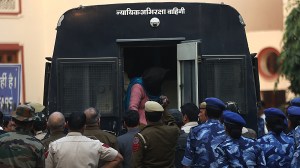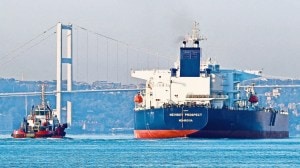Before talks,Pak raises n-bogey: India can make 100 nukes a year
Barely a week before the Indo-Pak Foreign Secretary-level talks here,Pakistan has,surprisingly,upped the ante against India in the Conference of Disarmament....
Barely a week before the Indo-Pak Foreign Secretary-level talks here,Pakistan has,surprisingly,upped the ante against India in the Conference of Disarmament (CD) at Geneva with its representative saying that New Delhis nuclear and strategic weapons programme posed a clear and present danger to Islamabad. And making a bizarre claim that after the nuclear deal,India could now make up to 100 nuclear warheads a year.
India intervened to make the point that Pakistan should not raise bilateral issues in a multilateral forum but the Pakistani representative had already delivered a setback to the CD with an eight-page statement on its perceived threat from India.
Citing this as the prime reason for being unable to give a go-ahead to discussions on a Fissile Materials Cut-off Treaty,Pakistani representative Zamir Akram said Islamabad needed a clear assurance that FMCT would not just mean freezing future production of fissile material for weapons but would also cater to reduction of existing stockpiles.
He strongly came out against the Indo-US nuclear deal and the civil nuclear cooperation agreements between India and other countries. According to Akram,this freed up Indias domestic fissile material to advance its nuclear weapon capabilities.
The carte blanche that has been offered to our neighbour along with the commitments to build up its strategic and conventional capabilities has encouraged its hegemonic ambitions which are aimed at charting a course of dangerous adventurism whose consequences can be both unintended and uncontrollable. This includes their advocacy of fighting a limited war under a nuclear overhang or environment which has been termed as the Cold Start doctrine, said Akram on Thursday in a statement before the CD.
He also brought up Indian plans to be prepared for war on two fronts. This confronts Pakistan with a clear and present danger. Therefore,the National Command Authority (NCA) of Pakistan,the highest decision making body on strategic issues…on January 13,2010,concluded that Pakistan cannot be oblivious to these developments in our neighbourhood, he added.
Underlining that Pakistans NCA decided not to support any approach or measure that would be prejudicial to its legitimate national security interest,Akram spelled out four specific concerns:
* Transfer of unlimited amounts of fissile material to our neighbouring country will enable it to build up its strategic reserves and that will allow it to divert own indigenous stocks of fissile material to making nuclear weapons. Pakistan estimates that India can produce fifty to sixty nuclear weapons a year this way.
* Claiming that the safeguards arrangements with India were not foolproof,Akram said there was a danger of material being secretly diverted and in such a situation the annual production will go up to a hundred weapons per year.
* Such a situation in the future,according to Pakistan,would increase existing asymmetry in fissile material stockpiles and will be accentuating Pakistans security concerns for maintaining a credible deterrence capability.
* The FMCT being currently proposed,Pakistan said,was only a non-proliferation move as it banned future production and not a disarmament move aimed at reducing stockpiles. Accordingly,such a treaty would be selective,discriminatory and derogate from the objectives of nuclear disarmament. For these reasons,it is unacceptable to Pakistan.
Pakistan didnt spare the Barack Obama Administration. Akram observed that Pakistan had hoped for a change of heart in Washington after the leadership changed but the optimism was shortlived. He pointed out to Indias recent efforts at building ICBMs and submarine launched missiles,and added: More ominously,by June 2009,it became clear that the deal was part of a larger strategic design.
Coming down hard on Russia,France and US for signing nuclear cooperation agreements with India,Pakistan said most of the vociferous champions of non-proliferation had also jumped most enthusiastically on this gravy train.
In the broad sweep that Akram made,he took on the 45-member Nuclear Suppliers group. Pointing out that this group was set up as a consequence of Indias first nuclear test in 1974,he termed as ironic that the group had decided unanimously to reward the perpetrator of such proliferation.



- 01
- 02
- 03
- 04
- 05




























